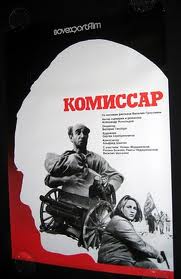The Commissar: Difference between revisions
No edit summary |
No edit summary |
||
| (8 intermediate revisions by 3 users not shown) | |||
| Line 1: | Line 1: | ||
====Date: [[:Category: | ====Date: [[:Category:1965 - 1969|1965 - 1969]]==== | ||
====Region: [[:Category:Russia and Central Asia|Russia and Central Asia]]==== | |||
====Subject: [[:Category:Political/Economic/Social Opinion|Political/Economic/Social Opinion]] [[:Category:Religious|Religious]]==== | |||
====Medium: [[:Category:Film Video|Film Video]]==== | |||
====Medium: [[:Category:Film Video|Film Video | |||
---- | ---- | ||
[[File:Commissar.jpg|right]] | |||
'''Artist:''' Aleksandr Askoldov (b. 1932) | |||
'''Confronting Bodies:''' The Soviet State Cinema Committee (Goskino) | |||
'''Confronting Bodies:''' The Soviet State Cinema Committee | |||
'''Dates of Action:''' October 1965 through March 1969 | '''Dates of Action:''' October 1965 through March 1969 | ||
'''Location:''' Russia | '''Location:''' Russia | ||
'''Description of Artwork:''' Askoldov's film, ''The Commissar'', is about a pregnant revolutionary commissar who takes refuge with a Jewish family during the Russian Revolution just prior to her delivery. After her son is born, the town is overtaken by the counter-revolutionary White Army. She flees the town and her son to rejoin her regiment. The film also depicts the Jewish family's fate during the holocaust. ''The Commissar'' was produced to celebrate the 50th anniversary of the Russian Revolution. <P> | |||
'''Description of Artwork:''' Askoldov's film, | |||
'''The Incident:''' From the onset of production, Askoldov was forced to make changes to his film. Members of Goskino believed that the film presented the revolution too dramatically, and not heroically enough. Askoldov was forced to change the character's language to make her appear less coarse, and to make the birth scene so it was less natural. After the Six Day War, Goskino had Askoldov change the nationality of the Jewish family and remove all references to the holocaust. In 1968, Askoldov recieved a letter commenting on the vulgar manner that the character crushed her sugar lumps in one scene. In March of 1969, Askoldov was dismissed from the film and reprimanded by the Communist Party. <P> | '''The Incident:''' From the onset of production, Askoldov was forced to make changes to his film. Members of Goskino believed that the film presented the revolution too dramatically, and not heroically enough. Askoldov was forced to change the character's language to make her appear less coarse, and to make the birth scene so it was less natural. After the Six Day War, Goskino had Askoldov change the nationality of the Jewish family and remove all references to the holocaust. In 1968, Askoldov recieved a letter commenting on the vulgar manner that the character crushed her sugar lumps in one scene. In March of 1969, Askoldov was dismissed from the film and reprimanded by the Communist Party. <P> | ||
'''Results of Incident:''' In 1986 the Conflict Commission of the Film-makers Union recommended the re-release of ''The Commissar''. Goskino refused to act. After a plea from Askoldov at the Moscow Film Festival, the film was reconstructed in 1988. It won the Silver Bear Special Jury Prize at the Berlin Film Festival in 1988. <P> | |||
'''Results of Incident:''' In 1986 the | |||
'''Source:''' Censorship, A World Encyclopedia, ed. D. Jones | '''Source:''' Censorship, A World Encyclopedia, ed. D. Jones | ||
{{DEFAULTSORT:Commissar, The}} | |||
[[Category:1968]] | |||
[[Category: | [[Category:1960s]] | ||
[[Category: | [[Category:20th century]] | ||
[[Category:Russia and Central Asia]] | [[Category:Russia and Central Asia]] | ||
[[Category:Political/Economic/Social Opinion]] | [[Category:Political/Economic/Social Opinion]] | ||
[[Category:Religious]] | [[Category:Religious]] | ||
[[Category:Film Video]] | [[Category:Film Video]] | ||
[[Category:Aleksandr Askoldov]] | [[Category:Aleksandr Askoldov]] | ||
__NOTOC__ | __NOTOC__ | ||
{{DISPLAYTITLE:<span style="font-style: italic;">The Commissar</span>}} | |||
Latest revision as of 20:37, 19 February 2012
Date: 1965 - 1969
Region: Russia and Central Asia
Subject: Political/Economic/Social Opinion Religious
Medium: Film Video
Artist: Aleksandr Askoldov (b. 1932)
Confronting Bodies: The Soviet State Cinema Committee (Goskino)
Dates of Action: October 1965 through March 1969
Location: Russia
Description of Artwork: Askoldov's film, The Commissar, is about a pregnant revolutionary commissar who takes refuge with a Jewish family during the Russian Revolution just prior to her delivery. After her son is born, the town is overtaken by the counter-revolutionary White Army. She flees the town and her son to rejoin her regiment. The film also depicts the Jewish family's fate during the holocaust. The Commissar was produced to celebrate the 50th anniversary of the Russian Revolution.
The Incident: From the onset of production, Askoldov was forced to make changes to his film. Members of Goskino believed that the film presented the revolution too dramatically, and not heroically enough. Askoldov was forced to change the character's language to make her appear less coarse, and to make the birth scene so it was less natural. After the Six Day War, Goskino had Askoldov change the nationality of the Jewish family and remove all references to the holocaust. In 1968, Askoldov recieved a letter commenting on the vulgar manner that the character crushed her sugar lumps in one scene. In March of 1969, Askoldov was dismissed from the film and reprimanded by the Communist Party.
Results of Incident: In 1986 the Conflict Commission of the Film-makers Union recommended the re-release of The Commissar. Goskino refused to act. After a plea from Askoldov at the Moscow Film Festival, the film was reconstructed in 1988. It won the Silver Bear Special Jury Prize at the Berlin Film Festival in 1988.
Source: Censorship, A World Encyclopedia, ed. D. Jones
